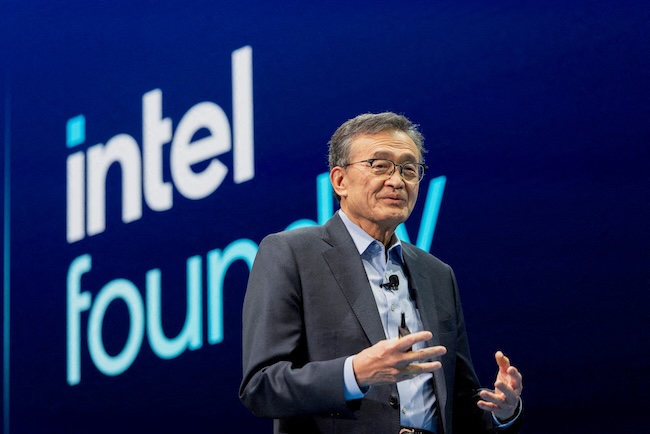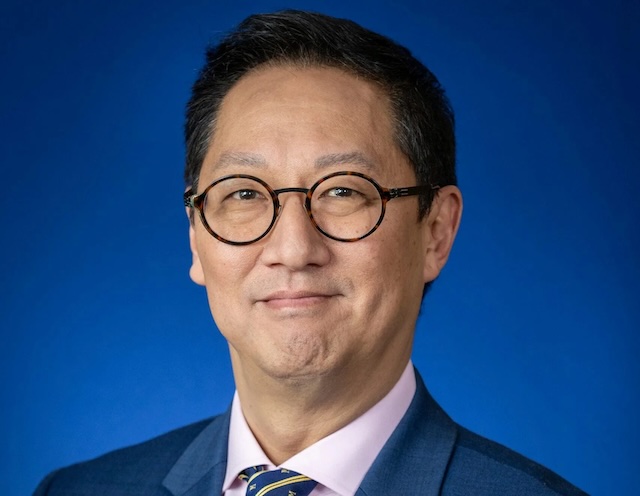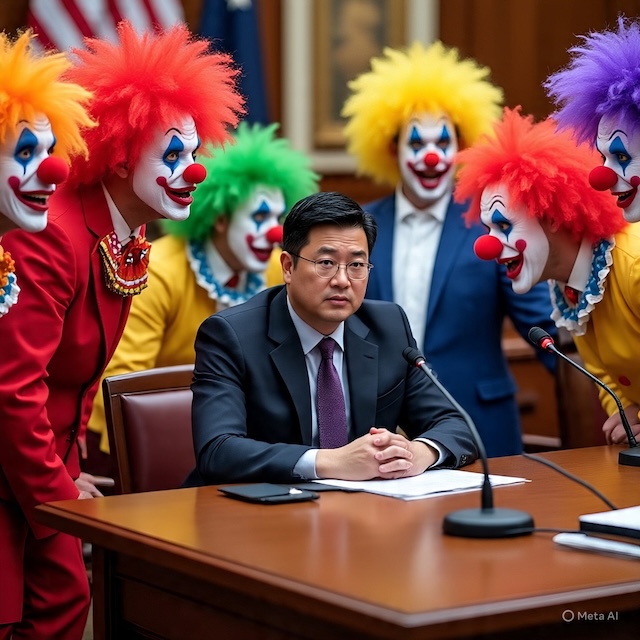National Security Risk and Conflict of Interest Are Code For Asian Americans in Key Positions
By Romen Basu Borsellino | 12 Aug, 2025
The charge that Intel CEO Lip-Bu Tan poses a conflict of interest exemplifies the hypocrisy and racism underlying Trump’s outbursts.
On Friday a social media post by President Trump alleged that "The CEO of INTEL is highly CONFLICTED and must resign, immediately.”
Just three days later, Intel CEO Lip-Bu Tan was reportedly heading to the White House to sing for his supper.
•
Anyone with the slightest familiarity with the President can of course recognize the tactic of forcing those in his crosshairs to bend the knee, whether at Trump Tower in New York, Mar-A-Lago in Florida, or the White House in DC.
We’ve seen it from Mitt Romney, Marco Rubio, and countless others, some of whom have gone on to have amicable relationships with Trump.
But what might be less obvious is the more specific pattern that Trump’s tirade against Tan falls into: One that questions the loyalty and patriotism of Asian Americans.
“Conflicts of Interest”
Despite claims by Trump and those in his party, it’s hard to believe that attempts to discredit the Chinese Malaysian CEO are actually about conflicts of interest and not simply part of a greater campaign to instill fear in Asians.
Trump’s call for Tan’s resignation came just minutes after Republican Senator Tom Cotton appeared on Fox Business to discuss "concern about the security and integrity of Intel's operations and its potential impact on U.S. national security.”
In April Reuters reported that Tan had claimed hundreds of millions in investments across hundreds of companies, many of which are Chinese. As a successful businessman, Tan’s investments should be of little surprise.
As a businessman himself Trump should understand this. The idea that these are conflicts of interest simply feels like a cover to target Tan.
Let’s start with an obvious fact: This Administration has no actual concern about conflicts of interest.
Even the strongest supporters of Trump's policies should be able to recognize that the Trump family has used the office of the Presidency to enhance their personal wealth by literal billions. Just a few examples include:
A media company settling baseless lawsuits with Trump so that his administration would approve a merger.
In March, Tesla CEO and Trump administration official Elon Musk held a showcase of Tesla vehicles on the White House lawn, a move that was quickly slammed by ethics experts.
And just this Monday, the same day that reports of his meeting with Tan broke, Trump’s own Crypto-currency startup World Liberty Financial announced a $1.5 billion purchase that will make the company a key treasury asset. Per the New York Times, “The deal marks the latest expansion of the Trumps’ sprawling crypto empire, which has buoyed the family’s finances and created sweeping conflicts of interest.”
Additionally, Trump is working to block the passage of a bill that would limit conflicts of interest by elected officials. Over the past several weeks, a bipartisan group of lawmakers have been working to advance a bill that would ban stock trading by elected officials including members of Congress, the President, and Vice President.
Trump has lashed out at the bill’s Republican sponsor Josh Hawley calling him a “Second-tier Senator” as a result of his efforts. Hawley has, by all accounts, been a strong ally of Trump’s
Suffice it to say, conflicts of interest do not appear to be a real concern for Trump.
“National Security”
If it’s not really about moral integrity, then that leaves Trump and Cotton’s accusation of national security concerns against Tan.
But, once again, we already know that actual national concerns are not something that this Administration takes particularly seriously.
This past March, less two months into his term, the President’s Secretary of Defense, National Security Advisor, Vice President and others, were caught illegally exchanging highly sensitive war plans over a group chat on the Signal App.
The chat became public when a journalist for the Atlantic was accidentally included, thus making him, a civilian, privy to critical details of the timing and locations of a US attack in Yemen. In response to the incident, The President did not denounce the actions of his team, but instead nominated the man responsible, Michael Waltz, for the highly coveted role of Ambassador to the United Nations.
This was just one in a long line of national security lapses including Trump’s removal of highly classified documents from the White house following the completion of his first term, some of which were found in a bathroom at his Mar-A-Lago resort in Florida.
But none of this has stopped Trump and his allies from using national security as an excuse to attack Asian Americans. Like his use of the phrases “China virus” and “Kung Flu” surrounding the COVID pandemic, which led to a rise in hate crimes against Asians in the US.
Or recent Republicans bills that would strip Chinese students of their visas and prevent them from coming to this country to study.
Ultimately, it is tough to reach any conclusion other than the following: Trump’s attacks on Tan were motivated by his race.
The Real Reason
Some might be inclined to cite Trump’s efforts to remove non-minorities from power as evidence that his claims against Tan are not racially motivated. Trump is, after all, currently involved in a months-long effort to oust Jerome Powell, the Federal Reserve Chairman who Trump, himself, appointed.
But Powell, a White man, is ostensibly at odds with Trump over a policy disagreement regarding interest rates. He has not been accused of posing a national security threat or been forced to reaffirm his love for this country.
That humiliation is uniquely reserved for people of color.
Following Trump’s Friday remarks, Tan sent a letter to his employees affirming his patriotism. “The United States has been my home for more than 40 years. I love this country and am profoundly grateful for the opportunities it has given me.”
The President’s attack on Tan resembles a similar situation from 2022. Trump made headlines for his multiple racist rants against Elaine Chao, his own former Secretary of transportation and the wife of Senator Mitch McConnell.
Over a series of social media posts, Trump referred to Chao as Mitch McConnell’s “China-loving CoCo Chow,” and baselessly referenced McConnell “helping his crazy wife and family get rich on China!”
Aside from the mere fact that Chao is Asian, there appears to be zero basis to question any nefarious financial ties to China.
Sounds familiar, doesn't it?
Scapegoating 101
•
None of this is to say that there may not be valid criticism of Tan’s performance as head of Intel. He took over at a tumultuous time for the company and is –– likely by no fault of his own given the quick timeline –– yet to claim a turnaround.
But that’s also how scapegoating tends to work.
Take, for example, the January collision between an American Airlines flight and a Blackhawk military helicopter that left over 60 dead. President Trump wasted no time blaming “DEI” and baselessly claiming that the crash occurred as a result of his predecessors’ favoritism of minorities over White people.
This President will use any opening he can find to attack Blacks, Hispanics, and what seems especially the case at the moment, Asians.
Earlier this year, when Santa Ono, a candidate for President at the University of Florida, was rejected by the Republican-appointed Board of Governors over his “woke” ideology, one couldn’t help but wonder if Ono’s Japanese ethnicity was the real issue. The President’s son Donald Trump Jr. referred to Ono as a “woke psycho.”
Ono’s rejection came only after what one article in the Chronicle of Higher Education described as “An accomplished man reduced to pandering.”
One can only hope that the meeting with Trump has not placed Tan in a similar position.
The Meeting
Lip-Bu Tan is a highly accomplished businessman who has likely navigated numerous hostile situations, not unlike this one.
However he chooses to respond to Trump’s anti-Asian racism is likely a decision born of thoughtfulness and personal experience.
But it’s also important to keep in mind that Trump’s criticisms are not made in good faith. They are, more likely, a cover to continue sowing the seeds of prejudice.
Perhaps a meeting between Trump and Tan can tell us who the truly superior businessman is. The odds are, it’s not the one who uses national security as an excuse to cast shade on an entire community.
Ultimately, it's tough to reach any conclusion other than the following: Trump’s attacks on Tan were motivated by his race.

Asian American Success Stories
- The 130 Most Inspiring Asian Americans of All Time
- 12 Most Brilliant Asian Americans
- Greatest Asian American War Heroes
- Asian American Digital Pioneers
- New Asian American Imagemakers
- Asian American Innovators
- The 20 Most Inspiring Asian Sports Stars
- 5 Most Daring Asian Americans
- Surprising Superstars
- TV’s Hottest Asians
- 100 Greatest Asian American Entrepreneurs
- Asian American Wonder Women
- Greatest Asian American Rags-to-Riches Stories
- Notable Asian American Professionals

